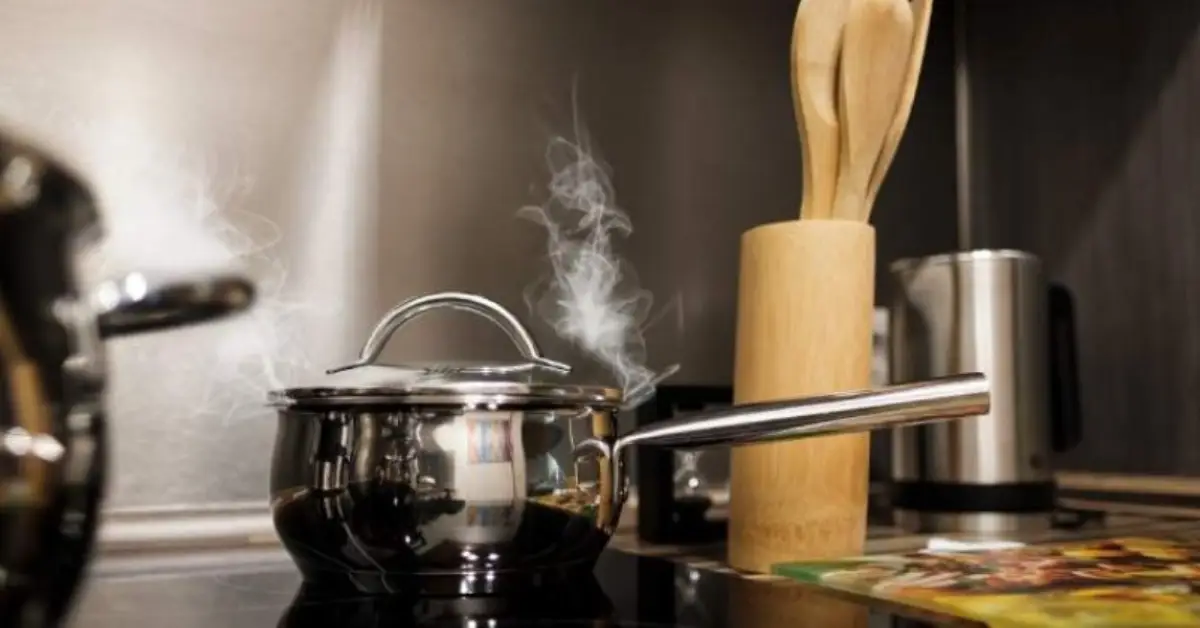10 Easy Habits to Keep Your Kitchen Fresh All Day — No Expensive Products Needed!
I don’t know about you, but I’ve spent more than a few evenings cooking only to be hit by that stubborn, lingering kitchen smell afterward. No matter how many candles or sprays I tried, the scent of last night’s garlic or burnt toast seemed to stick around like an uninvited guest.
Over the years, I’ve learned that keeping a kitchen smelling fresh isn’t about fancy products or expensive gadgets—it’s about simple habits you can build into your daily routine. In this article, I’m going to share the ten habits that have worked for me and countless others, so your kitchen feels welcoming, clean, and surprisingly fragrant all day long. By the end, you’ll have actionable tips you can start today—and trust me, your nose will thank you.
Why your kitchen smells in the first place
I’ve noticed that no matter how often I clean, my kitchen sometimes still has a lingering smell. Understanding why this happens is the first step to keeping it fresh. Here’s what’s usually going on:
Common odor sources:
- Trash: Food scraps sitting too long can turn into a mini science experiment of odors.
- Old food: Forgotten leftovers in the fridge or pantry can start to emit noticeable smells.
- Sink drains & garbage disposals: These spots trap food residue and moisture, creating a breeding ground for odor-causing bacteria.
- Appliances: Ovens, microwaves, and even coffee makers can hold onto grease and scents.
- Poor ventilation: Without airflow, even minor smells can linger and mix into a general kitchen funk.
If you want to dig deeper into the kinds of odors you might not even notice—but your guests do—check out this guide on the hidden home smells and what to do about them.
How smells linger: Smells often stick because grease and food particles cling to surfaces, and moisture encourages bacterial growth. Even small spills or splashes can become persistent odors if they aren’t cleaned quickly.
Why masking smells isn’t enough: Air fresheners and sprays might cover up odors temporarily, but the source remains. As Southern Living points out, true freshness comes from eliminating the root cause rather than just masking it. Otherwise, your kitchen will always carry that invisible, underlying smell.
Habit #1: Ventilate first thing & after cooking

Fresh air is your best friend when it comes to a smell-free kitchen. I make it a habit to open windows or run my exhaust fan before and after cooking—and it makes a world of difference.
Here’s how I do it:
- When and how long: Open windows or switch on the range hood right before you start cooking and keep it running for at least 5–10 minutes after you finish.
- Quick tip: I often set a timer on my phone for 10 minutes post-cook. It’s a small habit, but it guarantees the air circulates enough to carry smells away.
- No windows? No problem: If you don’t have a window in your kitchen, a portable fan or air purifier works wonders for moving stale air around.
Ventilating isn’t just about removing odors—it also keeps the air in your kitchen feeling lighter and more inviting.
Habit #2: Take out the trash & clean the bin nightly
I can’t stress this enough: your trash is one of the main sources of kitchen odors. Leaving it overnight or waiting for it to fill up can make your kitchen smell stale and unwelcoming.
Here’s my nightly routine:
- Don’t wait for it to fill up: Even small scraps can start decomposing fast. Empty the bin every night.
- Keep the bin clean: Wipe down the interior, sprinkle a layer of baking soda at the bottom, and rinse it weekly to prevent odors. According to Woman & Home, this simple step dramatically reduces lingering smells.
- Night-time checklist: Bag the trash, tie it up securely, and take it out before you go to bed. It’s a small habit, but it prevents odors from building up while you sleep.
By tackling your trash consistently, you’re stopping odors at the source—and that’s what really makes your kitchen smell fresh all day.
Habit #3: Clean and deodorise the sink & garbage disposal weekly
I’ve learned that the sink and garbage disposal are sneaky culprits for lingering kitchen smells. Even when the counters look spotless, grease and decomposing food in your sink or disposal can create a subtle but persistent odor. Tackling this weekly keeps your kitchen smelling fresh.
Here’s my go-to routine:
- Simple DIY flush: Sprinkle baking soda down the drain, pour in some vinegar, and follow with a flush of hot water. It lifts residue and neutralizes odor.
- Lemon trick: Drop a few lemon slices or lemon ice cubes into the disposal and run it. The citrus oils cut grease and leave a clean, fresh scent. Better Homes & Gardens recommends this as a simple, natural way to freshen your disposal.
- What to check: Don’t forget hidden areas like rubber seals, drain traps, and under the sink. Wiping these occasionally keeps odors from building up out of sight.
Even just 5–10 minutes a week on your sink can prevent stubborn smells that otherwise linger all day.
Habit #4: Wipe surfaces daily — counters, cabinets, walls

I always tell myself: if you wipe your surfaces daily, you’re preventing smells before they even start. Grease, food splashes, and even steam residue can cling to counters, cabinets, and walls, silently building odors.
Here’s my daily surface routine:
- Quick end-of-day wipe: Set a 3-minute timer. Wipe counters, cabinet fronts, and backsplash with a damp cloth or sponge.
- Cleaning mix: I usually use a mild all-purpose cleaner—or a simple DIY solution: water + vinegar + a few drops of essential oil. It’s safe, effective, and smells pleasant.
- Don’t forget the small stuff: Handles, light switches, and even the edges of cabinets can hold odor-causing grime. A quick swipe keeps the kitchen smelling like it just got cleaned.
This habit is so simple, but it makes a noticeable difference every single day.
Habit #5: Clean your fridge and freezer monthly
One of the biggest surprises I’ve had is how much forgotten food in the fridge contributes to kitchen odor. Even small spills or a wilted vegetable can make the air feel stale.
Here’s my fridge routine:
- Weekly micro-check: Scan for expired produce and wipe up any minor spills before restocking.
- Monthly deep-clean: Empty the fridge, unplug if necessary, remove shelves and drawers, and wipe everything down with a safe cleaner.
- Pro tip: Keep an open box of baking soda on a shelf to naturally absorb odors over time.
Keeping your fridge in check isn’t glamorous, but it’s a cornerstone of a fresh-smelling kitchen.
Habit #6: Use natural odour absorbers you already have
This is where you really see that a fresh kitchen doesn’t require fancy products. Simple, everyday items can do wonders for neutralizing odors.
Try these methods:
- Pantry fixes: Lemon peels, coffee grounds, and baking soda can absorb or mask odors naturally. Place them near trash, in your fridge, or in containers around the kitchen.
- Simmer pot method: Boil water with citrus peels and cloves. The gentle steam fills your kitchen with a clean, inviting aroma.
- Activated charcoal bags: Small charcoal pouches placed strategically (like under the sink or near the trash) absorb odors continuously. Swap them every few months for best results.
Habit #7: Manage cooking smells proactively (while you cook)

I’ve noticed that the moment I start cooking, the smell of onions or fish can linger long after the meal is done. Tackling odors while you cook saves you hours of scrubbing and spraying later.
Here’s what I do:
- Cover your pots and pans: Keeping lids on while frying or simmering minimizes smell escaping into the kitchen. Turn on your hood/exhaust fan at the same time.
- Remove food promptly: Once cooking is done, transfer hot food into sealed containers immediately. It stops steam and aroma from hanging around.
- Clean utensils right away: Cutting boards, knives, and other utensils used for strong-smelling foods like garlic, onions, or fish should be rinsed or scrubbed immediately to prevent the smell from embedding.
Being proactive while cooking keeps the kitchen air lighter and makes post-cook cleaning so much easier. For even more natural methods to tackle lingering cooking smells, here’s a list of 10 proven strategies you can use without chemicals.
Habit #8: Maintain kitchen appliances & vents
I can’t stress this enough: even if your counters are spotless, dirty appliances and vents can silently spread odors. Many guides gloss over this, but it’s a crucial step.
Here’s my routine:
- Range hood filter: Clean or replace every 3–6 months, or monthly if you cook a lot. This prevents grease buildup that traps odors.
- Appliances: Wipe seals and drip trays in the dishwasher, microwave, toaster, and coffee machine. These spots collect grime and smell over time.
- Vent hood ducts: Check for blockages and clean if needed. Proper airflow is key to removing cooking smells efficiently.
Habit #9: Keep humidity low & dry out textiles asap
Moisture is a sneaky contributor to stale smells. Damp towels, sponges, and wet dishes can turn your kitchen into a faintly musty environment without you noticing.
Here’s how I manage it:
- After dishwashing: Wipe down the sink area and hang wet towels immediately.
- Ventilation while cooking: Use your exhaust fan when boiling or steaming, and crack a door if needed to let moisture escape.
- Replace sponges & cloths: Swap them every 1–2 weeks to prevent odor buildup. Real Simple notes that keeping textiles dry is one of the easiest ways to prevent lingering kitchen smells.
Even small steps like these make a kitchen feel noticeably fresher every day.
Habit #10: Weekly mini‑reset with a checklist

Consistency is everything. A quick weekly reset prevents small odors from turning into a full-blown kitchen funk. I like to follow a checklist every week to stay on top of it:
Weekly checklist:
- Empty trash
- Wipe counters, cabinets, and backsplash
- Check fridge produce and remove expired items
- Flush drains with baking soda + vinegar
- Wipe visible appliance seals and filters
Monthly deeper check:
- Clean or replace range hood filters
- Empty and deep-clean the fridge
- Move bins and rinse thoroughly
If you like a structured approach, I use a checklist from Clean Deep—it’s simple and ensures I don’t skip any step.
Following this mini-reset habit keeps the kitchen smelling fresh all week without needing extra products or effort.
Bonus tips & quick fixes (for when you spot a “bad smell spike”)
Even with all the habits in place, sometimes your kitchen might hit a sudden “bad smell spike.” I’ve been there, and these quick fixes can save the day:
- Vinegar bowl trick: Place an open bowl of white vinegar in the fridge or near the trash overnight. It absorbs odors naturally.
- Simmer a citrus pot: Boil water with citrus peels and a dash of vanilla.
- Drain rinse: Flush your sink drains with hot water, salt, and baking soda to lift hidden grime and odors.
If the smell persists: Check less obvious spots—under the sink, behind the fridge, or vent ducts that rarely get cleaned. These hidden areas are often the source of lingering odors. If you ever feel like adding a quick scent boost, these home sprays are highly recommended and make any kitchen smell instantly inviting.
Final thoughts & how to keep the habit
At the end of the day, keeping your kitchen smelling fresh isn’t about magic sprays—it’s about consistency. Small daily habits beat occasional deep-cleaning every time. Here’s how I make it stick:
- Set a 10-minute “smell-free check” alarm: Tie it to an existing routine, like after dinner, to make it automatic.
- Track progress: Keep a simple before-and-after checklist for smells. Over time, you’ll notice which habits matter most.
I’d love to hear what works for you! Leave a comment below with your favorite kitchen-fresh tricks, or visit Build Like New for more practical tips on keeping your home fresh, functional, and beautiful.
Keeping your kitchen smelling amazing all day is possible—it just takes a few intentional habits and a bit of consistency. Try these tips, and soon your kitchen will feel inviting, clean, and fresh every single day.
Disclaimer: These tips are based on general cleaning and kitchen maintenance practices. Results may vary depending on your kitchen size, appliances, and habits. Always follow safety guidelines when handling cleaning products or hot surfaces.


